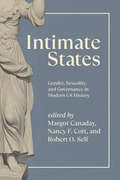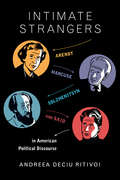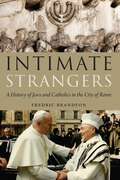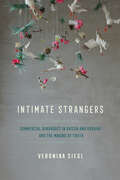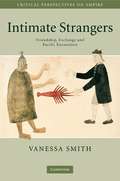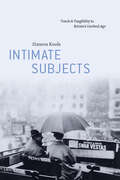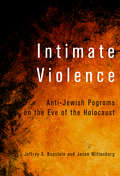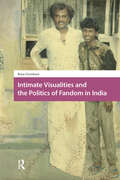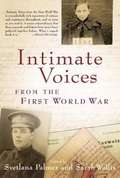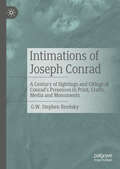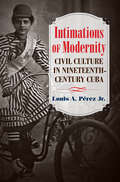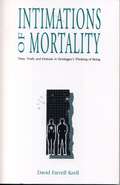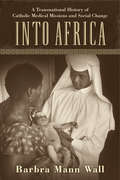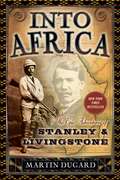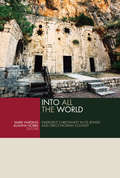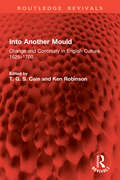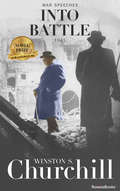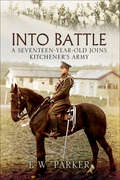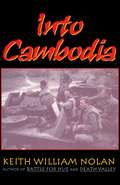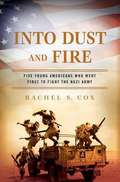- Table View
- List View
Intimate States: Gender, Sexuality, and Governance in Modern US History
by Nancy F. Cott Margot Canaday Robert O. SelfFourteen essays examine the unexpected relationships between government power and intimate life in the last 150 years of United States history. The last few decades have seen a surge of historical scholarship that analyzes state power and expands our understanding of governmental authority and the ways we experience it. At the same time, studies of the history of intimate life—marriage, sexuality, child-rearing, and family—also have blossomed. Yet these two literatures have not been considered together in a sustained way. This book, edited and introduced by three preeminent American historians, aims to close this gap, offering powerful analyses of the relationship between state power and intimate experience in the United States from the Civil War to the present. The fourteen essays that make up Intimate States argue that “intimate governance”—the binding of private daily experience to the apparatus of the state—should be central to our understanding of modern American history. Our personal experiences have been controlled and arranged by the state in ways we often don’t even see, the authors and editors argue; correspondingly, contemporary government has been profoundly shaped by its approaches and responses to the contours of intimate life, and its power has become so deeply embedded into daily social life that it is largely indistinguishable from society itself. Intimate States makes a persuasive case that the state is always with us, even in our most seemingly private moments.
Intimate States: Gender, Sexuality, and Governance in Modern US History
by Nancy F. Cott Margot Canaday Robert O. SelfFourteen essays examine the unexpected relationships between government power and intimate life in the last 150 years of United States history. The last few decades have seen a surge of historical scholarship that analyzes state power and expands our understanding of governmental authority and the ways we experience it. At the same time, studies of the history of intimate life—marriage, sexuality, child-rearing, and family—also have blossomed. Yet these two literatures have not been considered together in a sustained way. This book, edited and introduced by three preeminent American historians, aims to close this gap, offering powerful analyses of the relationship between state power and intimate experience in the United States from the Civil War to the present. The fourteen essays that make up Intimate States argue that “intimate governance”—the binding of private daily experience to the apparatus of the state—should be central to our understanding of modern American history. Our personal experiences have been controlled and arranged by the state in ways we often don’t even see, the authors and editors argue; correspondingly, contemporary government has been profoundly shaped by its approaches and responses to the contours of intimate life, and its power has become so deeply embedded into daily social life that it is largely indistinguishable from society itself. Intimate States makes a persuasive case that the state is always with us, even in our most seemingly private moments.
Intimate States: Gender, Sexuality, and Governance in Modern US History
by Nancy F. Cott Margot Canaday Robert O. SelfFourteen essays examine the unexpected relationships between government power and intimate life in the last 150 years of United States history. The last few decades have seen a surge of historical scholarship that analyzes state power and expands our understanding of governmental authority and the ways we experience it. At the same time, studies of the history of intimate life—marriage, sexuality, child-rearing, and family—also have blossomed. Yet these two literatures have not been considered together in a sustained way. This book, edited and introduced by three preeminent American historians, aims to close this gap, offering powerful analyses of the relationship between state power and intimate experience in the United States from the Civil War to the present. The fourteen essays that make up Intimate States argue that “intimate governance”—the binding of private daily experience to the apparatus of the state—should be central to our understanding of modern American history. Our personal experiences have been controlled and arranged by the state in ways we often don’t even see, the authors and editors argue; correspondingly, contemporary government has been profoundly shaped by its approaches and responses to the contours of intimate life, and its power has become so deeply embedded into daily social life that it is largely indistinguishable from society itself. Intimate States makes a persuasive case that the state is always with us, even in our most seemingly private moments.
Intimate Strangers
by Andreea Deciu RitivoiAndreea Deciu Ritivoi is professor of English at Carnegie Mellon University. Her research focuses on immigration, exile, political discourse, argumentation theory, and intellectual history. She is the author of Yesterday's Self: Nostalgia and the Immigrant Identity and Paul Ricoeur: Tradition and Innovation in Rhetorical Theory.
Intimate Strangers: A History of Jews and Catholics in the City of Rome
by Fredric BrandfonThe Jewish community of Rome is the oldest Jewish community in Europe. It is also the Jewish community with the longest continuous history, having avoided interruptions, expulsions, and annihilations since 139 BCE. For most of that time, Jewish Romans have lived in close contact with the largest continuously functioning international organization: the Roman Catholic Church. Given the church&’s origins in Judaism, Jews and Catholics have spent two thousand years negotiating a necessary and paradoxical relationship. With engaging stories that illuminate the history of Jews and Jewish-Catholic relations in Rome, Intimate Strangers investigates the unusual relationship between Jews and Catholics as it has developed from the first century CE to the present in the Eternal City. Fredric Brandfon innovatively frames these relations through an anthropological lens: how the idea and language of family have shaped the self-understanding of both Roman Jews and Catholics. The familial relations are lopsided, the powerful family member often persecuting the weaker one; the church ghettoized the Jews of Rome longer than any other community in Europe. Yet respect and support are also part of the family dynamic—for instance, church members and institutions protected Rome&’s Jews during the Nazi occupation—and so the relationship continues. Brandfon begins by examining the Arch of Titus and the Jewish catacombs as touchstones, painting a picture of a Jewish community remaining Jewish over centuries. Papal processions and the humiliating races at Carnival time exemplify Jewish interactions with the predominant Catholic powers in medieval and Renaissance Rome. The Roman Ghetto, the forcible conversion of Jews, emancipation from the Ghetto in light of Italian nationalism, the horrors of fascism and the Nazi occupation in Rome, the Second Vatican Council proclamation absolving Jews of murdering Christ, and the celebration of Israel&’s birth at the Arch of Titus are interwoven with Jewish stories of daily life through the centuries. Intimate Strangers takes us on a compelling sweep of two thousand years of history through the present successes and dilemmas of Roman Jews in postwar Europe.
Intimate Strangers: Arendt, Marcuse, Solzhenitsyn, and Said in American Political Discourse
by Andreea Deciu RitivoiAndreea Deciu Ritivoi is professor of English at Carnegie Mellon University. Her research focuses on immigration, exile, political discourse, argumentation theory, and intellectual history. She is the author of Yesterday's Self: Nostalgia and the Immigrant Identity and Paul Ricoeur: Tradition and Innovation in Rhetorical Theory.
Intimate Strangers: Arendt, Marcuse, Solzhenitsyn, and Said in American Political Discourse
by Andreea Deciu RitivoiAndreea Deciu Ritivoi is professor of English at Carnegie Mellon University. Her research focuses on immigration, exile, political discourse, argumentation theory, and intellectual history. She is the author of Yesterday's Self: Nostalgia and the Immigrant Identity and Paul Ricoeur: Tradition and Innovation in Rhetorical Theory.
Intimate Strangers: Arendt, Marcuse, Solzhenitsyn, and Said in American Political Discourse
by Andreea RitivoiHannah Arendt, Herbert Marcuse, Alexander Solzhenitsyn, and Edward Said each steered major intellectual and political schools of thought in American political discourse after World War II, yet none of them was American, which proved crucial to their ways of arguing and reasoning both in and out of the American context. In an effort to convince their audiences they were American enough, these thinkers deployed deft rhetorical strategies that made their cosmopolitanism feel acceptable, inspiring radical new approaches to longstanding problems in American politics. Speaking like natives, they also exploited their foreignness to entice listeners to embrace alternative modes of thought. Intimate Strangers unpacks this "stranger ethos," a blend of detachment and involvement that manifested in the persona of a prophet for Solzhenitsyn, an impartial observer for Arendt, a mentor for Marcuse, and a victim for Said. Yet despite its many successes, the stranger ethos did alienate many audiences, and critics continue to dismiss these thinkers not for their positions but because of their foreign point of view. This book encourages readers to reject this kind of critical xenophobia, throwing support behind a political discourse that accounts for the ideals of citizens and noncitizens alike.
Intimate Strangers: Commercial Surrogacy in Russia and Ukraine and the Making of Truth
by Veronika SieglZooming in on commercial surrogacy in Russia and Ukraine, Intimate Strangers addresses market expansion into the intimate spheres of life that play out on women's bodies as mothers and workers. Veronika Siegl follows the inner workings of a surrogacy market marked by secrecy, distrust, and anonymous business relationships. She explores intended mothers' anxious struggles for a child in light of stigmatized infertility and the aggressive biopolitics of motherhood; the uncertain but pragmatic pathways in and out of fertility clinics as surrogates navigate harsh economic realities and resist being objectified or morally judged; and the powerful role of agents and doctors who have found a profitable niche in nurturing and facilitating other people's existential hopes. Intimate Strangers discusses these issues against the backdrop of ultra-conservatism and moral governance in Russia, the rising international popularity of the Ukrainian surrogacy market, and the pervasiveness of neo-liberal ideologies and individualized notions of reproductive freedom.
Intimate Strangers: Friendship, Exchange and Pacific Encounters
by Vanessa SmithWhen Louis Antoine de Bougainville reached Tahiti in 1768, he was struck by the way in which 'All these people came crying out tayo, which means friend, and gave a thousand signs of friendship; they all asked nails and ear-rings of us.' Reading the archive of early contact in Oceania against European traditions of thinking about intimacy and exchange, Vanessa Smith illuminates the traditions and desires that led Bougainville and other European voyagers to believe that the first word they heard in the Pacific was the word for friend. Her book encompasses forty years of encounters from the arrival of the Dolphin in Tahiti in June 1767, through Cook's and Bligh's voyages, to early missionary and beachcomber settlement in the Marquesas. It unpacks both the political and emotional significances of ideas of friendship for late eighteenth-century European, and particularly British, explorations of Oceania.
Intimate Subjects: Touch and Tangibility in Britain's Cerebral Age
by Simeon KooleAn insightful history of nineteenth- and twentieth-century Britain told through a single sense: touch. When, where, and who gets to touch and be touched, and who decides? What do we learn through touch? How does touch bring us closer together or push us apart? These are urgent contemporary questions, but they have their origins in late nineteenth- and early twentieth-century Britain, when new urban encounters compelled intense discussion of what touch was, and why it mattered. In this vividly written book, Simeon Koole excavates the history of these concerns and reveals how they continue to shape ideas about “touch” in the present. Intimate Subjects takes us to the bustling railway stations, shady massage parlors, all-night coffee stalls, and other shared spaces where passengers, customers, vagrants, and others came into contact, leading to new understandings of touch. We travel in crammed subway cars, where strangers negotiated the boundaries of personal space. We visit tea shops where waitresses made difficult choices about autonomy and consent. We enter classrooms in which teachers wondered whether blind children could truly grasp the world and labs in which neurologists experimented on themselves and others to unlock the secrets of touch. We tiptoe through London’s ink-black fogs, in which disoriented travelers became newly conscious of their bodies and feared being accosted by criminals. Across myriad forgotten encounters such as these, Koole shows, touch remade what it meant to be embodied—as well as the meanings of disability, personal boundaries, and scientific knowledge. With imagination and verve, Intimate Subjects offers a new way of theorizing the body and the senses, as well as a new way of thinking about embodiment and vulnerability today.
Intimate Violence: Anti-Jewish Pogroms on the Eve of the Holocaust
by Jeffrey S. Kopstein Jason WittenbergWhy do pogroms occur in some localities and not in others? Jeffrey S. Kopstein and Jason Wittenberg examine a particularly brutal wave of violence that occurred across hundreds of predominantly Polish and Ukrainian communities in the aftermath of the Nazi invasion of the Soviet Union. The authors note that while some communities erupted in anti-Jewish violence, most others remained quiescent. In fact, fewer than 10 percent of communities saw pogroms in 1941, and most ordinary gentiles never attacked Jews.Intimate Violence is a novel social-scientific explanation of ethnic violence and the Holocaust. It locates the roots of violence in efforts to maintain Polish and Ukrainian dominance rather than in anti-Semitic hatred or revenge for communism. In doing so, it cuts through painful debates about relative victimhood that are driven more by metaphysical beliefs in Jewish culpability than empirical evidence of perpetrators and victims. Pogroms, they conclude, were difficult to start, and local conditions in most places prevented their outbreak despite a general anti-Semitism and the collapse of the central state. Kopstein and Wittenberg shed new light on the sources of mass ethnic violence and the ways in which such gruesome acts might be avoided.
Intimate Visualities and the Politics of Fandom in India (Asian Visual Cultures)
by Roos GerritsenIn Intimate Visualities and the Politics of Fandom in India, Gerritsen explores the circulation of images of a movie star named Rajinikanth. Cities and towns in the south Indian state Tamil Nadu are consistently ornamented with huge billboards, murals and myriad posters featuring political leaders as well as movie stars. A selective part of these images is put up by their fan clubs. Tamil movie fans typically manifest themselves by putting up images of their star in public spaces and by generating a plethora of images in their homes. Gerritsen argues that these images are a crucial part of the everyday affective modes of engagement with family members and film stars but they are also symbolizing the political realm in which fans situate themselves. At the same time, Gerritsen shows how these image productions seem to concur with other visual regimes articulated in government restrictions, world class imaginaries and upper class moralities as presented on India's urban streets.
Intimate Voices from the First World War
by Sarah Wallis Svetlana PalmerIn the tradition of the work of Studs Turkel and Ken Burns' "The Civil War," this book is the companion volume to a major television series--a compelling, personal account of World War I and its devastating aftermath. Photos & maps throughout.
Intimations of Joseph Conrad: A Century of Sightings and Citings of Conrad’s Presences in Print, Crafts, Media and Monuments
by G.W. Stephen BrodskyMaster mariner and pioneer author of Modernist technique Joseph Conrad (1857-1924) achieved such eminence in his lifetime that his presence, explicit or implicit, could be found in the lives and works of several contemporaries of consequence. Through the century since his death he has lived on as a presence in the works of later authors to the present day. A collection spanning fifteen years of the present author’s sightings of Conrad’s presences are not only literary, but also memorial. Monuments, sculpture, ships, plaques, the performing arts, cabinetry and even a pub find a place. Each sighting is described in its context—a couple of certain or likely sightings by Conrad, such as Molière and Matthew Arnold, and the rest sightings or ambient intimations of Conrad’s presence –fiction and social commentary in novels and film by significant authors who carry on his legacy, from contemporaries such as H.G. Wells, Ford Madox Ford and F. Scott Fitzgerald to moderns George Orwell, Albert Camus, John Le Carrée, Ian MacEwan and John Banfield, among others. Presented in a clear yet poetic prose style, this record of Conrad’s influence on these contemporary and later writers brings a significant dimension to their interpretation; conversely Conrad’s place may be perceived more precisely in the historically broadening canon from Modernist to Postmodern. Together with its illustrations, Intimations of Joseph Conrad is a novel and unique concept, as entertaining as it is informative.
Intimations of Modernity: Civil Culture in Nineteenth-Century Cuba
by Louis A. PérezLouis A. Perez Jr.'s new history of nineteenth-century Cuba chronicles in fascinating detail the emergence of an urban middle class that was imbued with new knowledge and moral systems. Fostering innovative skills and technologies, these Cubans became deeply implicated in an expanding market culture during the boom in sugar production and prior to independence. Contributing to the cultural history of capitalism in Latin America, Perez argues that such creoles were cosmopolitans with powerful transnational affinities and an abiding identification with modernity. This period of Cuban history is usually viewed through a political lens, but Perez, here emphasizing the character of everyday life within the increasingly fraught colonial system, shows how moral, social, and cultural change that resulted from market forces also contributed to conditions leading to the collapse of the Spanish colonial administration.Perez highlights women's centrality in this process, showing how criollas adapted to new modes of self-representation as a means of self-fulfillment. Increasing opportunities for middle-class women's public presence and social participation was both cause and consequence of expanding consumerism and of women's challenges to prevailing gender hierarchies. Seemingly simple actions--riding a bicycle, for example, or deploying the abanico, the fan, in different ways--exposed how traditional systems of power and privilege clashed with norms of modernity and progress.
Intimations of Mortality: Time, Truth, and Finitude in Heidegger's Thinking of Being (G - Reference, Information and Interdisciplinary Subjects)
by David Farrell KrellHeidegger’s thinking has an underlying unity, this book argues, and has cogency for seemingly diverse domains of modern culture: philosophy and religion, aesthetics and literary criticism, intellectual history and social theory. “The theme of mortality—finite human existence—pervades Heidegger’s thought,” in the author’s words, “before, during, and after his magnum opus, Being and Times, published in 1927.” This theme is manifested in Heidegger’s work not “as funereal melodramatics or as despair and destructive nihilism” but rather “as a thinking within anxiety.” Four major subthemes in Heidegger’s thinking are explored in the book’s four parts: the fundamental ontology developed in Being and Time; the “lighting and clearing” of Being, understood as “unconcealment”; the history of philosophy—with emphasis on Heraclitus, Hegel, and Nietzsche—interpreted as the “destiny” of Being; and the poetics of Being, explicated as the “fundamental experience” of mortality. Neither an introduction nor a survey, this book is a close reading of a wide range of Heidegger’s books, lectures, and articles—including extensive material not yet translated into English—informed by the author’s conversations with Heidegger in 1974–76. Each of the four subthemes is treated critically. The aim of the book is to push its interrogations of Heidegger’s thought as far as possible, in order to help the reader toward an independent assessment of his work and to encourage novel, radically conceived approaches to traditional philosophical problems.
Into Africa: A Transnational History of Catholic Medical Missions and Social Change
by Professor Barbra Mann WallThe most dramatic growth of Christianity in the late twentieth century has occurred in Africa, where Catholic missions have played major roles. But these missions did more than simply convert Africans. Catholic sisters became heavily involved in the Church's health services and eventually in relief and social justice efforts. In Into Africa, Barbra Mann Wall offers a transnational history that reveals how Catholic medical and nursing sisters established relationships between local and international groups, sparking an exchange of ideas that crossed national, religious, gender, and political boundaries. Both a nurse and a historian, Wall explores this intersection of religion, medicine, gender, race, and politics in sub-Saharan Africa, focusing on the years following World War II, a period when European colonial rule was ending and Africans were building new governments, health care institutions, and education systems. She focuses specifically on hospitals, clinics, and schools of nursing in Ghana and Uganda run by the Medical Mission Sisters of Philadelphia; in Nigeria and Uganda by the Irish Medical Missionaries of Mary; in Tanzania by the Maryknoll Sisters of New York; and in Nigeria by a local Nigerian congregation. Wall shows how, although initially somewhat ethnocentric, the sisters gradually developed a deeper understanding of the diverse populations they served. In the process, their medical and nursing work intersected with critical social, political, and cultural debates that continue in Africa today: debates about the role of women in their local societies, the relationship of women to the nursing and medical professions and to the Catholic Church, the obligations countries have to provide care for their citizens, and the role of women in human rights. A groundbreaking contribution to the study of globalization and medicine, Into Africa highlights the importance of transnational partnerships, using the stories of these nuns to enhance the understanding of medical mission work and global change.
Into Africa: The Epic Adventures of Stanley and Livingstone (Charnwood Large Print Ser.)
by Martin DugardAmerican adventurer and adventure writer Dugard tells how British explorer David Livingstone (1813-73) sought the source of the Nile in the 1860s and 1870s, and how American reporter Henry M. Stanley went looking for him when he had been gone some time longer than expected. Annotation (c)2003 Book News, Inc. , Portland, OR (booknews. com)
Into All the World: Emergent Christianity in Its Jewish and Greco-Roman Context
by Mark Harding Alanna NobbsInto All the World—the third volume from editors Mark Harding and Alanna Nobbs on the content and social setting of the New Testament—brings together a team of eminent Australian scholars in ancient history, New Testament, and the early church to take the story of Christianity into the Jewish and Greco- Roman world of the first century. In thirteen chapters, the contributors discuss all the post-Pauline New Testament writings, devoting attention to both their content and their context. They examine the impact of the growth of the church on both Jews and Gentiles, exploring issues such as the diaspora, minorities, the Book of Acts, and the Fourth Gospel. The book then proceeds to a discussion of the impact of Christianity on the Roman state, including consideration of the book of Revelation and the imperial cult. A final chapter investigates how the church was perceived by Clement of Rome at the end of the first century.
Into Another Mould: Change and Continuity in English Culture 1625–1700 (Routledge Revivals)
by Ken Robinson T.G.S. CainIt is widely agreed that the period from 1625 to 1700 witnessed radical shifts in English life and thought. For historians of politics, science, religion, and philosophy, it is a time when the intellectual bases of modern thought and modern institutions were in the process of formation: divine monarchy gave way to contractual monarchy, the ‘truths’ of received authority gave way to those reached by inductive reasoning.Although the year 1660 to some extent marks a turning point, this comprehensive and fascinating book, Into Another Mould (originally published in 1992), demonstrates an underlying continuity within the period of Stuart rule. It presents thinkers and writers before and after 1660 responding to similar dilemmas, albeit with different attitudes, methods, and conclusions.Central to this volume are the related concepts of authority and reason. By looking at the changing attitudes to these two concepts in all spheres of life, it examines the crucial developments of the period and their bearing on the literature. Within this framework, the authors examine social and political history, religious belief and scientific knowledge, and painting, sculpture, and architecture as contexts for the literature of the time. This book will be a beneficial read for students and researchers of English literature, history, and cultural studies.
Into Battle (Winston S. Churchill War Speeches #1)
by Winston S. ChurchillThis first volume of collected essays and journalism from the Nobel Prize–winning prime minister includes some of his most important WWII speeches. Legendary politician and military strategist Winston S. Churchill was a master not only of the battlefield, but of the page and the podium. Over the course of forty books and countless speeches, broadcasts, news items and more, he addressed a country at war and at peace, thrilling with victory but uneasy with its shifting role in global politics. In 1953, he was awarded the Nobel Prize for Literature for &“his mastery of historical and biographical description as well as for brilliant oratory in defending exalted human values.&” During his lifetime, he enthralled readers and brought crowds roaring to their feet; in the years since his death, his skilled writing has inspired generations of eager history buffs. Churchill was at his best when rallying Britons to the twin causes of war and justice, delivering inspiration and hope during the hard years of bombings, violence, sacrifice, and terror. This compilation, composed of speeches made in the early years of the war, contains some of his best. Profound words from famous speeches in this collection include: &“This was their finest hour;&” &“Never in the field of human conflict was so much owed, by so many, to so few;&” and &“I have nothing to offer but blood, toil, tears and sweat.&” Many decades after the end of the war, Churchill&’s words still have the power to stir the blood—and inspire the heart. A must-read for all WWII history fans.
Into Battle: A Seventeen-Year-Old Joins Kitchener's Army
by E.W. ParkerWritten well over ninety years ago while the experiences of youth were still fresh in the authors mind, this is the story of a seventeen-year-old boy from the time he joined Kitcheners Army, as one of the first hundred thousand in 1914, until he found himself in hospital—an officer with the Military Cross—recovering from his last wound, on the day of the Armistice, 11 November, 1918.In no way a formal record of the great and terrible events it describes, this is a purely personal, almost private, account. It is a plain, unvarnished tale—and even more effective for that—of heroism, and the horror peculiar to trench warfare of the First World War.Interspersed with moments of pity, humor and a deep response to natural beauty and peace out of the firing line, it is a record, which in its details, direct simplicity and manner of telling, comes nearer to the truth than many more ambitious accounts.
Into Cambodia: Spring Campaign, Summer Offensive, 1970
by Keith William Nolan"Most of us remember (the 1970 Cambodian campaign) best for the killings of four young people at Kent State. Nolan wants us to remember that it killed a lot of young Americans in Cambodia as well. " -- The Capital Tittles (Madison, WI)"This is combat narrative at its best. Nolan has mastered the soldier's slang and weaves it expertly into the account . . . . full of combat anecdotes detailing battlefield leadership successes and failures. " -- Military Review
Into Dust and Fire
by Rachel S. CoxThe untold story of five young American friends who left the ivory towers at Harvard and Dartmouth to take on Rommel's Panzers under the blazing sun of North Africa... In the spring of 1941, with Europe consumed by war and occupation, Britain stood alone against the Nazi menace. The United States remained wary of joining the costly and destructive conflict. But for five extraordinary young Americans, the global threat of fascism was too great to ignore. Six months before Pearl Harbor, these courageous idealists left their promising futures behind to join the beleaguered British Army. Fighting as foreigners, they were shipped off to join the Desert Rats, the 7th Armoured Division of the British Eighth Army, who were battling Field Marshal Rommel's panzer division. The Yanks would lead antitank and machine-gun platoons into combat at the Second Battle of El Alamein, the twelve-day epic of tank warfare that would ultimately turn the tide for the Allies. A fitting tribute to five men whose commitment to freedom transcended national boundaries, Into Dust and Fire is a gripping true tale of idealism, courage, camaraderie, sacrifice, and heroism. INCLUDES PHOTOS
